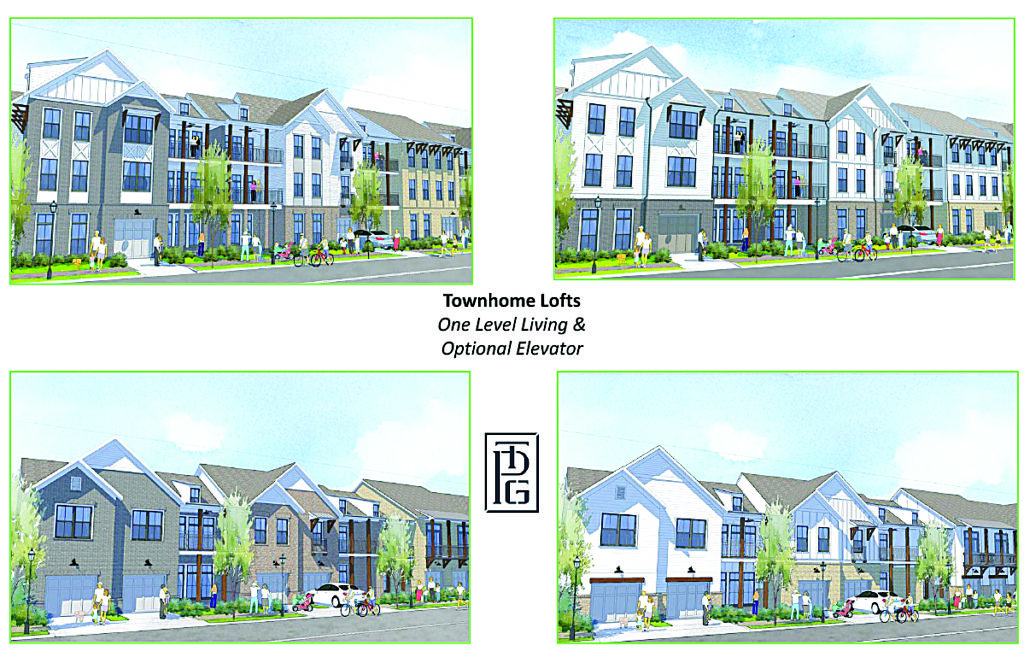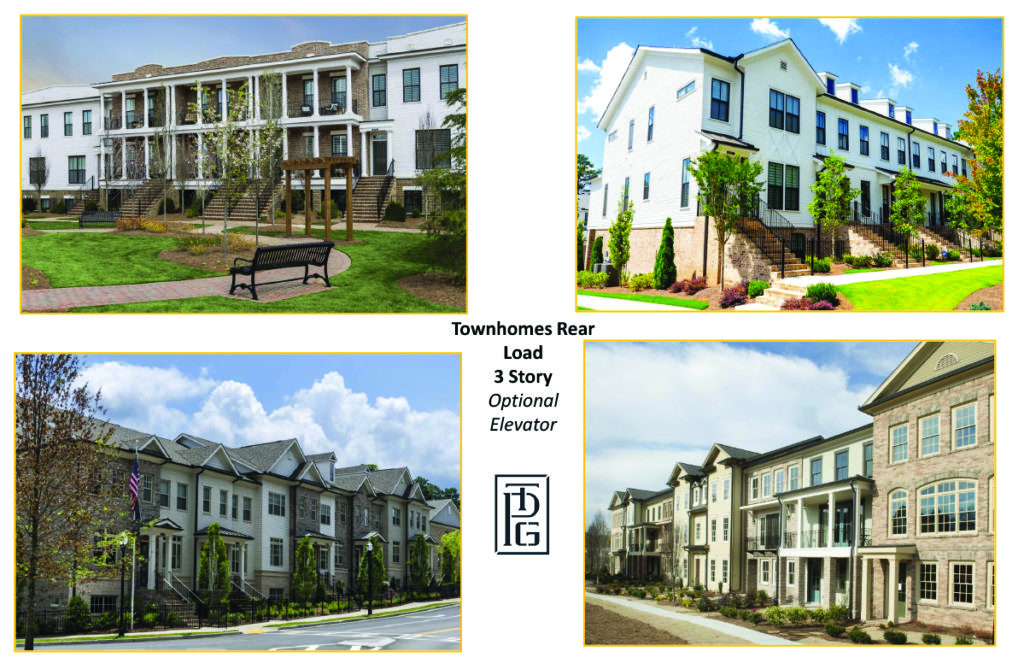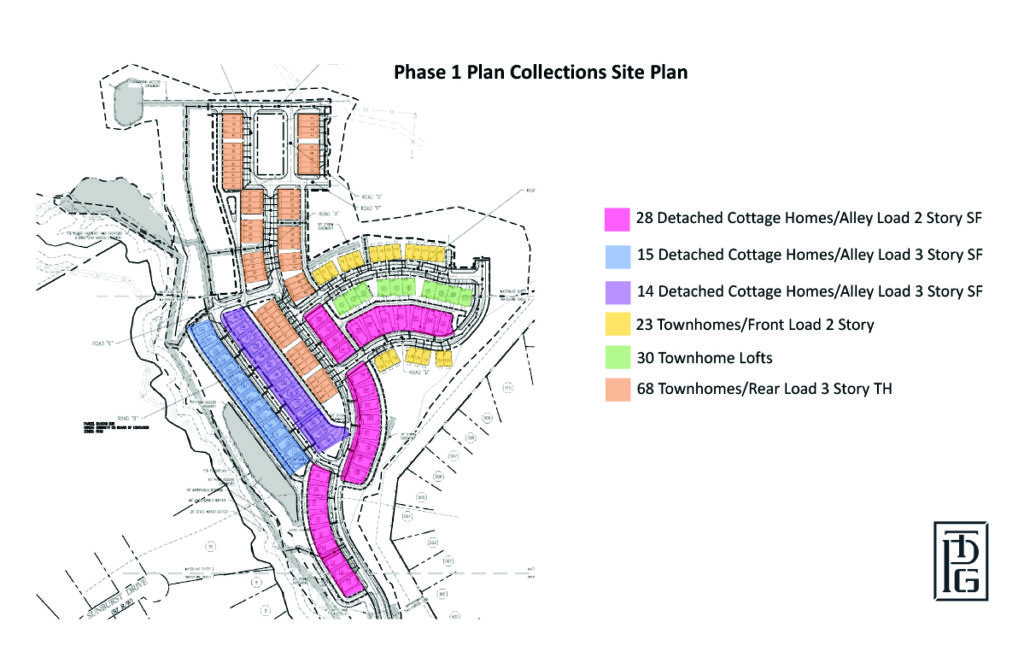City Government
City Council Approves Two Changes to Conditions to E.Jones Bridge Development
Published
4 years agoon
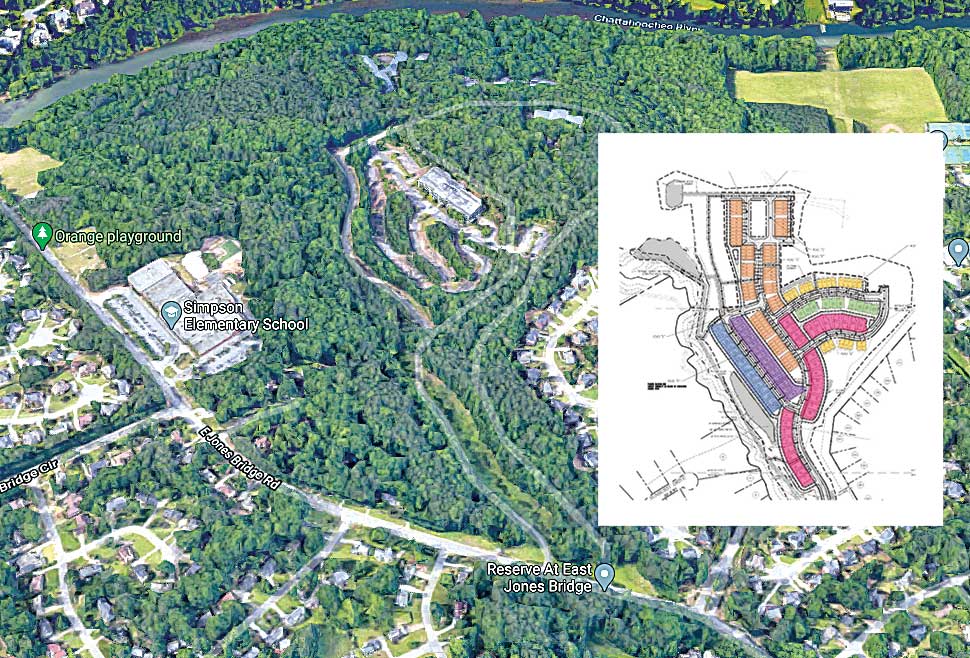
On Tuesday during its monthly meeting, the mayor and council approved two changes in conditions to the residential development planned for the 115-acre property on the former Fiserv site. The key change allows a portion of the residential unit types to be exempt from the 55+ age restrictions.
These two changes were made due to the impact of the COVID-19 pandemic which has altered the lending environment for developers of age-restricted residential communities.
The East Jones Bridge Road development will remain an active adult targeted community with approximately two-thirds of the planned residential units remaining 55+ age restricted. The master plan has not changed. Density, unit count and product type remain the same from the original site plan which was approved by city council back in May 2018.
“We know this residential development is very important to the community,” said Mayor Mike Mason. “However, without being flexible this change on the age restrictions, it was entirely possible that the developer would not be able to secure funding. The condition changes only apply to about one third of the units which will be constructed in the first phase. The vast majority of the units will remain 55+ age-restricted.”
To ensure that the property would remain a senior-living oriented community, the city council added four additional restrictions to the development:
- Community amenities should be designed to target active adults and shall not include playgrounds, basketball goals, or sports fields.
- Play sets, basketball goals, temporary or above-ground pools and trampolines shall be prohibited in private yards as per the HOA by-laws and covenants.
- Community pools shall not have diving boards, diving blocks or pool slides.
- School buses are prohibited on all private streets within the development.
The above restrictions are in addition to the conditions set forth in the original Special Use Permit which included smaller lot sizes, houses built close to the street, and a minimum distance between buildings.
“The developer had prepared the site for construction before the pandemic,” said City Manager Brian Johnson. “It was only after the coronavirus that they came to the city asking for flexibility. The impact of COVID-19 on senior communities has caused uncertainty and unrest among the industry in terms of financing for institutional projects (such as assisted living and long-term care units) as well as the comfort of aging adults to move into an exclusive 55+ community.”
The developer will continue to market this new development as an active adult community which will address the gap in housing types identified in the city’s 2040 Comprehensive Plan.
The second change of condition allows for more flexibility as to when the independent living or assisted living/memory care facilities may be constructed. It stipulates that no more than 450 residential units shall be completed prior to construction on either one of these facilities.
Click on this link to read the two change in conditions and a site plan map for Phase 1 with examples of the detached cottage homes, townhomes and townhome lofts that will be for sale.
Related
City Government
Crime and Safety Concerns Dominate Town Hall Meeting
Published
4 weeks agoon
March 27, 2024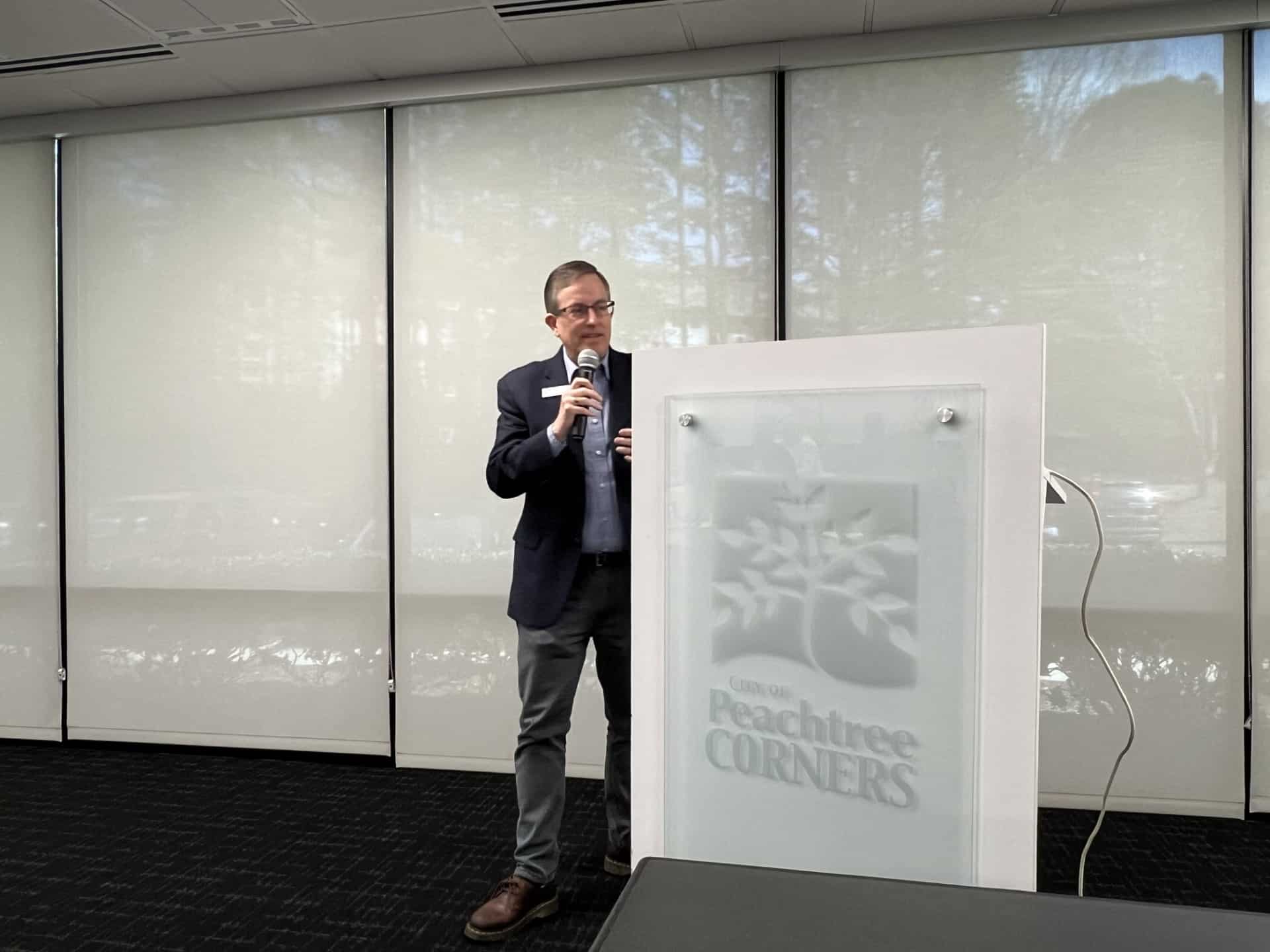
Besides his monthly newsletter, Peachtree Corners City Councilman Eric Christ occasionally hosts town hall meetings to allow constituents to catch up on what’s going on and give him feedback on a variety of issues.
On Sunday, March 24, several dozen residents and stakeholders gathered for updates at City Hall’s Community Chest room. Christ probably expected the gathering to last 90 minutes at the most, but the discussion lasted nearly three hours as he shared information about the Marshal program, development projects, the new dog park, deer and the May 21 primary election.
Cutting down on crime
Probably to nobody’s surprise, crime and public safety took up the bulk of the meeting. Christ wanted the audience to take away that crime in Peachtree Corners is down 25% from pre-pandemic times. He showed a chart with crime rates from 2019 through 2023 that showed a significant drop in crime overall.
- Residential burglaries are down by 48%.
- Thefts are down by 34%.
- Robberies are down by 24%.
“Prior to the pandemic in 2017, 2018 and 2019 we were averaging about 100 total [part one crimes] every month, and that dropped almost by half during the pandemic. Then, in 2021, it went back up a little bit again,” said Christ.
Even though the rate has increased year over year since 2020, it has not returned to pre-COVID levels. However, compared to the previous year, crime has increased by 23%. One solution may be the new City Marshal program that kicked off in November.
Having a relatively small population, the most heinous crimes, such as homicide and aggravated assault, have stayed lower than in many other areas. However, auto thefts, car break-ins, robberies and other property crimes remain somewhat high.
The City Marshal’s involvement
Chief City Marshal Edward Restrepo gave anecdotal evidence that the marshal program is working and will continue to get better because it fills the gaps left between the Gwinnett Police Department and the city’s code enforcement department.
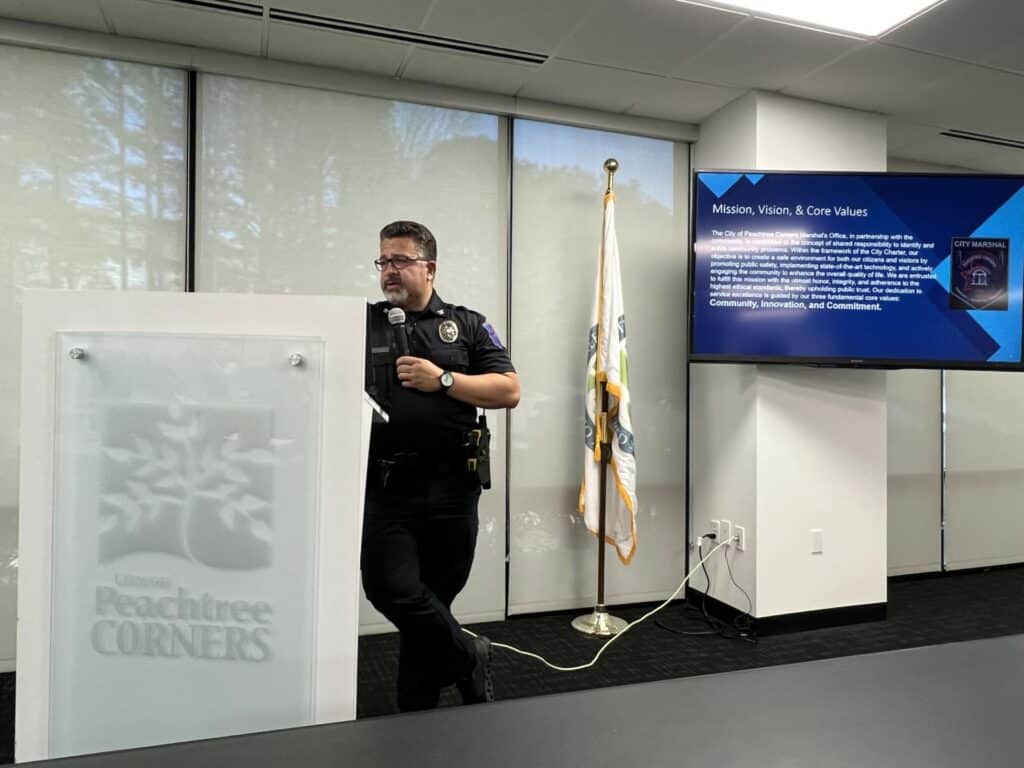
“We had a jewelry store robbery, and about the time we came in, we had started building up the camera registry as well as the integration system of cameras all around the city,” said Restrepo. “With only three of us, we have to rely on technology as much as we can.”
Although the marshals didn’t apprehend the bad guys, their assistance helped other law enforcement officers do their jobs more effectively. Several residents asked if there were plans to increase the marshal force to provide 24-hour, 7-day-a-week service.
The initial cost was around $900,000, said Christ, and maintaining the three officers and an administrative assistant will require about $700,000. Although Peachtree Corners doesn’t levy a property tax, the city’s share of county taxes goes toward that type of expense.
“It’s up to the people of Peachtree Corners if they want to increase the program,” said Christ. “It will come at a price.”
Those in attendance indicated that they thought that would be money well spent. Several said they liked seeing marshals at city-sponsored events because it sent a message that Peachtree Corners is serious about keeping its residents and visitors safe.
Christ said he and the rest of the council would consider that, but he reminded everyone that they should still report crimes to the police.
“I’ve had people tell me that they left a message on the city’s answering machine on a Friday evening and hadn’t heard back,” he said. “I tell them the first step is always to call 911.”
Catch the episode of the UrbanEBB podcast featuring Edward Restrepo from this past January here:
Related
City Government
Ora B. Douglass Swears in as First Black Female City Council Member of Peachtree Corners
Published
3 months agoon
January 20, 2024
After a successful run for the position of Peachtree Corners City Council Post 5 Ora B. Douglass will be sworn in as Peachtree Corners’ first Black female city councilmember on Tuesday, Jan. 23 during the regular City Council meeting.
Upon her retirement, Douglass was elected to the seat vacated by Lorri Christopher, one of two females to serve on the Peachtree Corners City Council, the other was Jeanine Aulbach.
Douglass’ inauguration continues Peachtree Corners’ commitment to diversity and inclusion by not only electing its first woman of color, but by recognizing her status as a military veteran and an advocate for better health care, education and quality of life for all.
She earned her Bachelor of Science degree in nursing from Florida A&M University and earned a Master of Nursing degree at Emory University.
After graduating nursing school, Douglass was commissioned an officer in the U.S. Army Nurse Corps. A veteran with over 13 years of service, she has been stationed in Hawaii and was part of the U.S. Army Reserves.
Douglass has chaired the most recent Veteran’s Day event in Peachtree Corners and looks forward to more efforts to recognize and celebrate the multiple cultures and contributions of the residents.
With her long history of community service in the area, her motto has always been “service first.”
In 2014, she led a group of members in chartering the Psi Omega Omega chapter of Alpha Kappa Alpha Sorority Inc. in Peachtree Corners where she served as president for over four years.
Psi Omega Omega chapter provides community service to Peachtree Corners residents from high school students, senior citizens, entrepreneurs and those in need. In addition, the sorority has partnered with Gwinnett County to keep 1.6 miles of road clean on Peachtree Corners Circle.
Douglass also established The Georgia Pearls of Service Foundation (GPOS), a 501(c)(3) fundraising arm of her chapter and serves currently as president of the foundation.
The GPOS foundation raises funds each year to provide scholarships to high school students and donations to selected community service organizations.
Douglass was appointed International Chair of Community Programming, a committee with representation from the 10 regions of the AKA sorority in providing direction and oversight of the program from 2018 to 2022.
The program defined the framework for Alpha Kappa Alpha’s commitment to service that is embraced by its 300,000 members and over 1,000 chapters located throughout the world.
Douglass and her team partnered with Walgreens and traveled to 36 states including a Native American reservation and to the country of Honduras during the COVID-19 pandemic.
The group administered mammograms, COVID vaccines and provided testing to low-income citizens.
Douglass was born at Atlanta’s Grady Hospital, but was raised in Fort Pierce, Florida. Orphaned at 18 months old, Douglass hasn’t lived a charmed life.
She has worked hard for her accomplishments and knows the importance of a good education, perseverance, dedication and service to all mankind. She promises to utilize these qualities in service to the citizens of Peachtree Corners.
She has worked at numerous hospitals in the Atlanta area including Emory University, and Grady Hospital.
At Northside Hospital she was vice president of Quality and Risk Management. She served as director of Community Home Based Nursing at the Veterans Administration Medical Center in Atlanta and VA Medical Centers in Carrollton and Oakwood where she directed a $10 million grant to provide homecare services to our veterans.
Douglass has practiced progressive clinical, managerial and healthcare administration for over 30 years.
Douglass currently serves on the board of the Fowler YMCA in Peachtree Corners and is also a member of the Peachtree Corners Rotary Club. Douglass enjoys playing pickleball, traveling, cooking, gardening and providing boxes in her yard for Eastern bluebirds to nest each spring.
Douglass is married to Dr. Adrian Douglass. They have four children and three grandchildren. She and her husband are members of Friendship Baptist Church in Duluth.
For more information, go to www.peachtreecornersga.gov.
Click here for more Peachtree Corners City Government news.
Related
Business
The Mayor’s Look at Business and Innovation Successes in 2023
Published
4 months agoon
December 29, 2023
From Peachtree Corners Mayor Mike Mason
As the year comes to a close, it seems like a good time to consider our businesses and say ‘Thank You!’ for helping to ensure our city’s success.
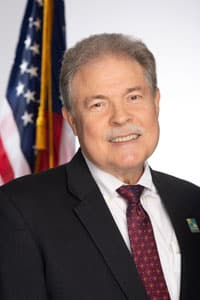
Business and innovation have always been at the heart of who we are as a community. We are a city that grew up organically around Technology Park. So, as we look back at 2023 at some of the many occurrences worth noting, I’d like to say ‘Thank You’ to our businesses, large and small.
And ‘thank you’ to all those entrepreneurs out there who had the courage to start their own businesses and put in the countless hours needed to make them successful. Without your success, we wouldn’t be here. Let’s look at some of the business activity in 2023.
In January, Fricke and Associates, a certified public accounting firm, consolidated two locations, bringing 25 new jobs and a $800,000 capital investment to the City of Peachtree Corners.
The firm signed a 9,000-square-foot office lease at 3500 Parkway Lane to help them better serve Metro Atlanta clients.
Early in the year, NAC International, a nuclear fuel cycle technology and consulting company, signed a deal for 23,000 square feet of space at 2 Sun Court in Peachtree Corners, while T-Mobile partnered with Curiosity Lab for a fun student hackathon the weekend of Feb. 24 to 26.
The city completed its second, five-year Economic Development Plan, this year. The plan guides activity, projects and policy aimed at improving the city’s economic climate.
The city also began its next Comprehensive Planning process, a plan renewed every year that guides development and redevelopment activity in the city.
Unlike other places, these plans don’t sit on a shelf here. We talk with our stakeholders, i.e. YOU, and develop plans to take us where you think we need to go. This is good old-fashioned logic at work, but back to our Year-in-Review.
Last January, city economic development staff visited a company in Peachtree Corners rather unsuspecting of the scope of the operation.
Guardian Sports manufactures products designed to keep people— especially young people—safer while playing sports. It is truly a gem. This Peachtree Corners company is designing and manufacturing sporting equipment worn by youth and high school football teams, college teams, and most recently, mandated by the NFL.
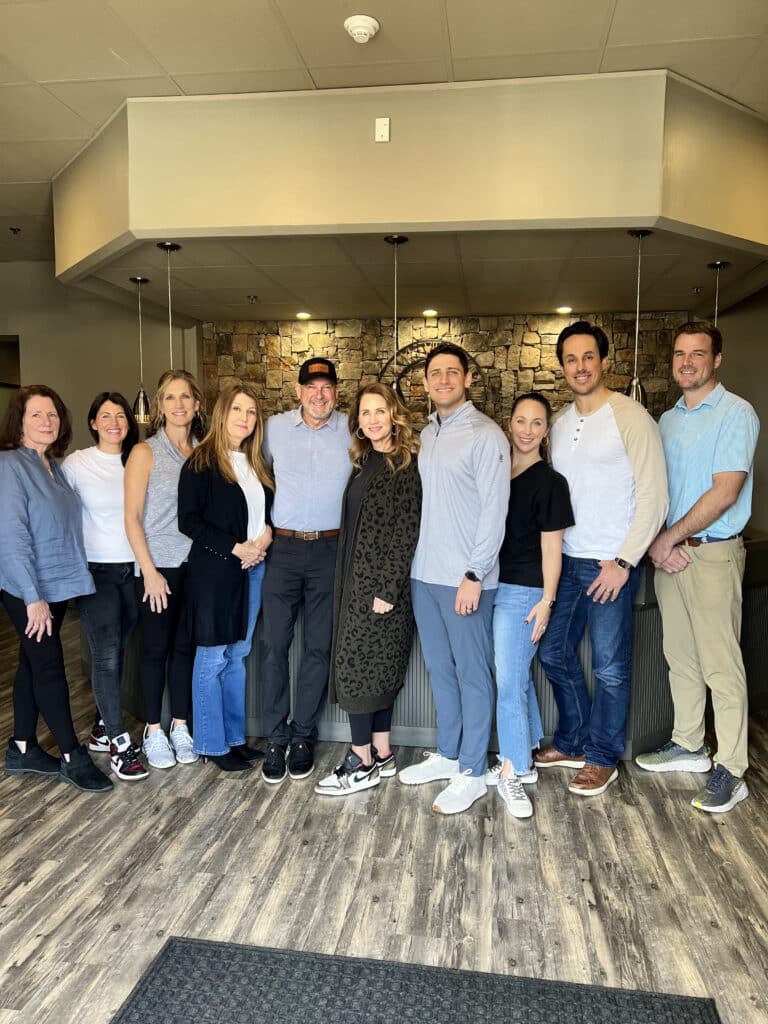
The company’s flagship product is the Guardian Cap, which was created to advance the standard football helmet by dispersing some of the energy that is generated during impacts. Check out a video HERE.
Insight Sourcing celebrated 20 years in business, announcing 20% firmwide growth in 2022, with 84 new team members added, of whom 23 joined as part of an acquisition.
Global Aviation celebrated 25 years of success while at the same time launching another company in the aerospace industry.
In February, the city began encouraging businesses to connect their security cameras with the Fusus network. Fusus is a nationally recognized public safety technology provider that has operated out of its headquarters in—you guessed it–Peachtree Corners since 2019.
The platform links cameras together and sends the feed to the West Precinct where Gwinnett Police officers can see situations in real-time and respond accordingly.
The cameras have helped solve homicides and other crimes in various cities, including Peachtree Corners. In July, Fusus made the annual Inc. 5000 list, the most prestigious ranking of the fastest-growing private companies in America.
Peachtree Farm, located in Technology Park, began attracting some attention on a grand scale this year, starting with a visit from Arthur Tripp Jr., the executive director of the USDA Farm Service Agency who visited Peachtree Farm in February.

Members of the Gwinnett County Farm Bureau and the Georgia Farm Bureau also visited Peachtree Farm in June to learn more about its operations and areas for possible collaboration.
Congresswoman Lucy McBath visited the farm this fall. The farm, located on Research Court, provides an inclusive and accessible community fostering the social, emotional and physical health and wellness of adults with disabilities.
Peachtree Farm first opened in 2021 to create jobs for those with intellectual and developmental disabilities.
In April, professional cyclists descended on Technology Parkway participating in the Curiosity Lab Criterium, a series of races on the streets of Peachtree Corners within the living laboratory environment of Curiosity Lab.
In May, North American Properties broke ground on The Forum redevelopment project, a great relief as there had been concerns about how to best generate more activity at the 20-year-old center.
North American Properties is redeveloping and revitalizing the property, adding a boutique hotel, food hall, open green spaces, new retail spaces and 381 apartments.
A 300-space parking deck will be constructed near Belk to allow for some parking to be reconstructed as open green space. Several new stores and restaurants have opened or are opening at The Forum, including Peche, lululemon and High Country Outfitters as well ass Petfolk Veterinarian clinic.
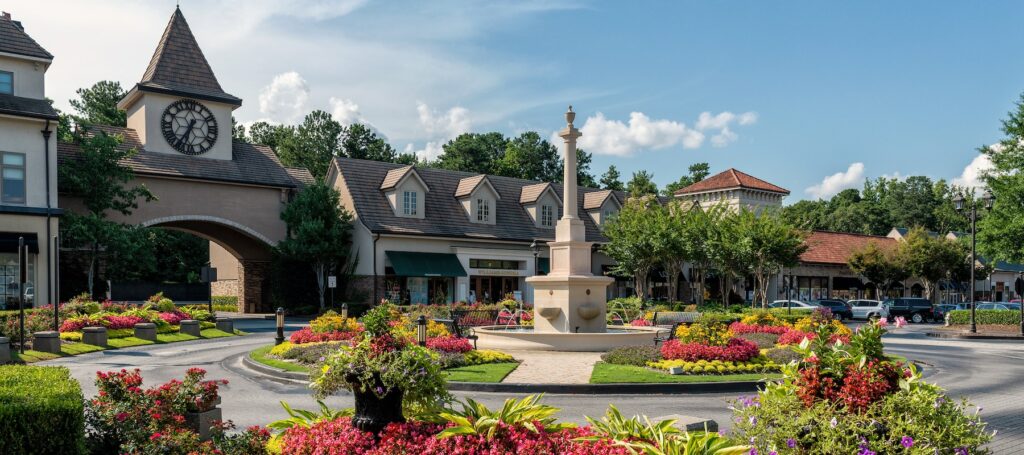
Politan Row will open at the Forum, part of the multi-million dollar renovation project by North American Properties. Politan Row, which has locations at Colony Square in Atlanta, as well as Houston and Chicago, will include seven independently owned restaurant spaces, a full bar, an outdoor patio along greenspace and a standalone restaurant and wine bar.
The German American Chamber of Commerce visited Curiosity Lab in May to learn more about Georgia, Gwinnett County and specifically Peachtree Corners. Also, a delegation of energy, technology and sustainability leaders visited the City of Peachtree Corners in October for several days, learning about area companies, Curiosity Lab and about how the city developed.
This year, Seoul Robotics established its United States office in Curiosity Lab at Peachtree Corners. The company’s presence in Curiosity Lab is fueling further development of a groundbreaking 3D perception platform.
Also this year, Siemens joined Curiosity Lab to support bringing 5G charging and electrification solutions to the United States.
Soliant, a leading provider of specialized healthcare and education staffing services, has been hiring hundreds of new employees across five offices in the Southeast. This expansion of approximately 300 people will give Soliant the internal resources to meet the growing nationwide demand for healthcare and education professionals.
Also, in terms of health and wellness, Atlas Behavioral Health opened at 3850 Holcomb Bridge Road while space was outfitted in June at 4941 S Old Peachtree Road for a Fyzical Therapy and Balance Center.
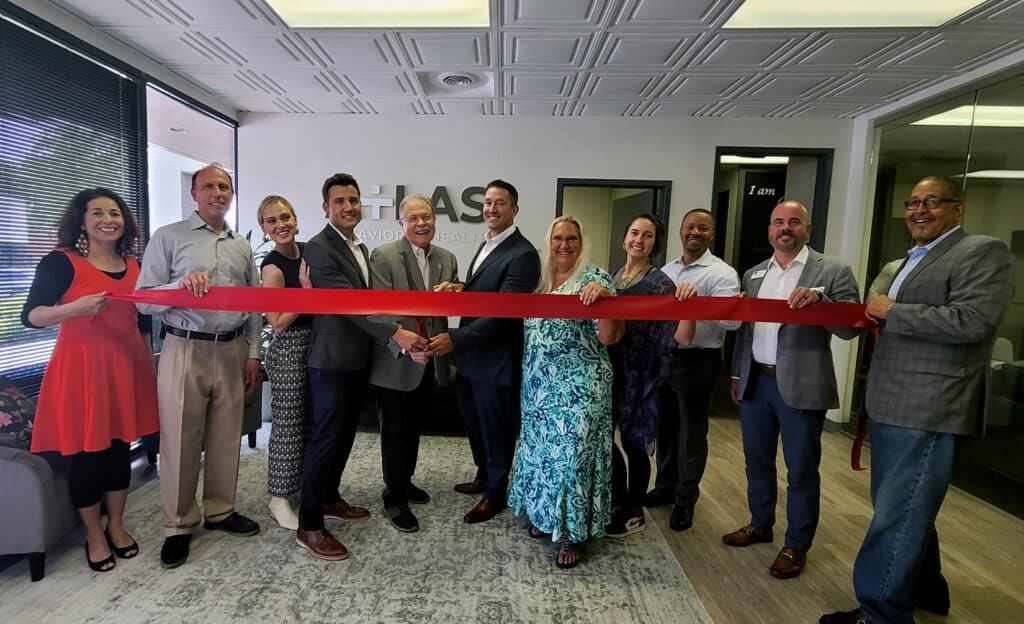
In June, Peachtree Corners was ranked #1 in Georgia and #19 in the nation in this year’s edition of the Fortune 50 Best Places to Live for Families. In August, Peachtree Corners was listed as one of the best places to live in Georgia by Niche.com.
On the environmental front, I can think of a few things coming out of Peachtree Corners this year which will likely help the world.
For example, Sidel, which manufactures packaging (among other things), has introduced a new bottle. Sidel announced a partnership with Coca-Cola Europacific Partners.
The company has been experiencing a great deal of growth and continues to hire more and more people. The bottle, which is for carbonated soft drinks, has a lighter neck and tethered cap. The tethered caps are expected to boost collection and recycling efforts, while preventing litter.
Pond Constructors Inc., Peachtree Corners, was awarded a $13 million modification contract to maintain and repair capitalized petroleum systems and facilities at the Joint Base Pearl Harbor-Hickam, Hawaii.
Also, ASHRAE (the American Society of Heating Refrigerating, and Air Conditioning Engineers) has published a pioneering code-enforceable standard developed to reduce the risk of infectious aerosol transmission in buildings.
There was some other activity in Technology Park as well. Specifically, ASBN Coworks opened at 420 Technology Parkway, in the heart of Tech Park.
DW1, previously known as Discount Waste, Inc., cut the ribbon on its new office at 250 Scientific Drive NW.
A Florida-based investment firm acquired four properties in Technology Park in August, all part of a portfolio selling for roughly $23.8 million.
The second-largest sale in Metro Atlanta that quarter, SF Partners purchased 30, 35 Technology Parkway South and 190 and 192 Technology Parkway from Terracap; a total of 247,208 square feet.
Thank you for reading about some of the impressive business happenings in our city this year. As we gear up for 2024, we looked forward to hearing about more successes, and helping to make sure the city’s businesses continue to grow and thrive.
Happy Holidays!
Mike Mason, Mayor
Related
Read the Digital Edition
Subscribe
Keep Up With Peachtree Corners News
Join our mailing list to receive the latest news and updates from our team.
You have Successfully Subscribed!

North American Properties Secures 3 New Brands for The Forum

Exploring Israeli Innovation in the Smart City Sector with Einav Gabbay [Podcast]

Georgia United Methodist Foundation Announces Changes to Finance Team

North American Properties Revitalizes Avenue East Cobb

BRACK: Peachtree Corners to lose Peterbrooke Chocolatier

Spring Voting Will Determine Important Gwinnett School Board Elections

Local Non-profit Boy With a Ball Announces Dates for Upcoming Conference

Local Non-profit Boy With a Ball Announces Dates for Upcoming Conference

Spring Voting Will Determine Important Gwinnett School Board Elections

BRACK: Peachtree Corners to lose Peterbrooke Chocolatier

Georgia United Methodist Foundation Announces Changes to Finance Team

North American Properties Revitalizes Avenue East Cobb

Exploring Israeli Innovation in the Smart City Sector with Einav Gabbay [Podcast]

North American Properties Secures 3 New Brands for The Forum

April/May Events Going on at Gwinnett County Parks

Light up the Corners [Video]

Capitalist Sage: Business Leadership in Your Community [Podcast]

Cliff Bramble: A Culinary Adventure through Italy

Top 10 Brunch Places in Gwinnett County

A Hunger for Hospitality

THE CORNERS EPISODE 3 – BLAXICAN PART 1

Top 10 Indoor Things To Do This Winter

The ED Hour: What it takes to Remove Barriers from Education
Peachtree Corners Life
Topics and Categories
Trending
-
Podcast1 week ago
Exploring Israeli Innovation in the Smart City Sector with Einav Gabbay [Podcast]
-
Faith1 week ago
Georgia United Methodist Foundation Announces Changes to Finance Team
-
Business1 week ago
North American Properties Revitalizes Avenue East Cobb
-
Business6 days ago
BRACK: Peachtree Corners to lose Peterbrooke Chocolatier


